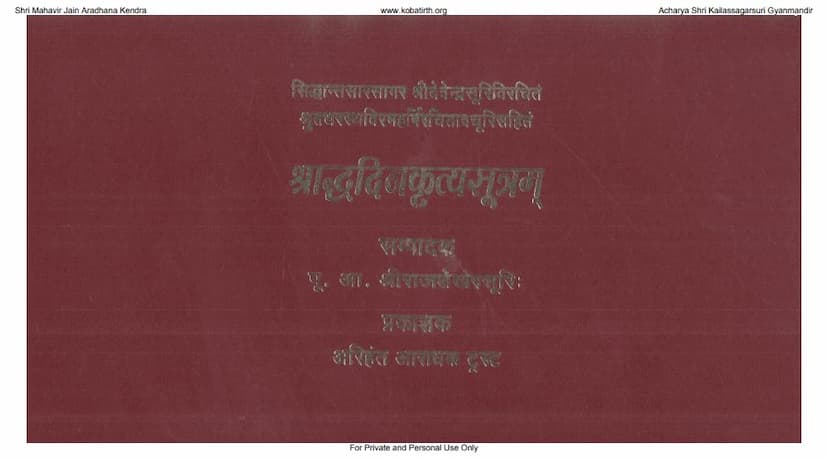Shraddhdin Krutya Sutram
Added to library: September 2, 2025

Summary
This document is a summary of the Jain text "Shraddhdin Krutya Sutram" by Acharya Shri Rajshekharsuri, published by Shri Arihant Aradhak Trust. It is a re-publication of a work originally authored by Acharya Shri Devendrasuri, with commentary (Avchuri) by an unknown author.
The book aims to provide guidance for the daily religious practices of a Shravak (lay Jain follower). It is structured into various "doors" or chapters, each detailing a specific aspect of a Shravak's daily routine and spiritual duties.
Here's a breakdown of the key themes and sections covered, based on the table of contents (which is extensive):
Core Principles and Daily Routine:
- Morning Rituals: The text begins with the importance of waking up early and performing the Namaskar Mantra (Navkar Mantra). It emphasizes the profound significance and benefits of chanting this mantra.
- Self-Reflection: A significant portion is dedicated to self-reflection and introspection, understanding one's identity as a Shravak, and adhering to vows (Anuvratas).
- Religious Observances: It details various religious activities, including:
- Chaitra Vandana (Temple Worship): Procedures for visiting and worshipping in temples, including proper conduct, bathing and dressing the idols, performing pujas with various offerings (flowers, incense, lamps, fruits, etc.), and reciting specific prayers and stanzas.
- Pratyakhyana (Renunciation/Vows): Taking vows and performing renunciations, both individually and in the presence of a guru.
- Kaya-utsarga (Meditation/Self-Discipline): Instructions on practicing kaya-utsarga, including the correct posture and avoiding common pitfalls.
- Satsanga (Good Company) and Avoiding Bad Company: Emphasizes the importance of associating with virtuous individuals and avoiding those who engage in harmful activities or have wrong philosophies.
- Ethical Conduct and Business Practices: A substantial part of the text focuses on ethical conduct in daily life, particularly in business. This includes:
- Avoiding Unethical Trade: Prohibitions against various forms of dishonest trade, such as adulteration, short measures, misleading practices, and dealing in prohibited items.
- Purity in Actions: Stressing the importance of purity in one's livelihood and actions, as this forms the foundation for spiritual progress.
- Food and Sustenance: Guidelines on food consumption, emphasizing the use of pure (Prashuk) and proper (Eshaniya) food, avoiding forbidden items, and the proper way to accept and consume food. It also covers practices like fasting and the importance of maintaining a regulated diet.
- Charity and Generosity: The text highlights the virtue of giving and charity, particularly to monks, nuns, and deserving individuals. It details the fruits of charity and the importance of selfless giving.
- Vatsalya (Compassion and Affection): The importance of showing compassion and affection towards fellow Jains (Sādharmikas) is stressed, along with the concept of "Bhava Vatsalya" (inner affection and care).
- Daily Duties: The text outlines a comprehensive list of daily duties for a Shravak, from waking up to sleeping, covering personal rituals, family interactions, and community responsibilities.
Key Figures and Historical Context:
- Acharya Devendrasuri: The original author is presented as a highly respected and influential Jain monk, known for his scholarship, adherence to conduct (Vichar), and significant role in propagating Jainism. The text provides biographical details about his life, his interactions with rulers, and his contributions to Jain literature.
- Gacchabheda (Schism): The text touches upon a significant event in Jain history concerning a schism within a monastic lineage, highlighting the differing practices and philosophies that led to it.
- Commentary: The presence of a commentary (Avchuri) suggests that the original text was considered important and required further explanation.
Content Overview by "Doors" (Chapters):
The extensive table of contents reveals that the book is meticulously structured, covering:
- Namaskar (Salutation): The significance and practice of the Namaskar Mantra.
- Smarana (Remembrance): Recollection of one's spiritual status.
- Vrata (Vows): Details on various vows undertaken by Shravaks.
- Yoga (Spiritual Practice): Emphasis on practices like Kaya-utsarga and meditation.
- Chaitra Vandana (Temple Worship): Detailed procedures for temple visits and worship.
- Pratyakhyana (Renunciation): Taking vows and resolutions.
- Chaitra Griha Gamana (Going to the Temple): The procedure for visiting temples.
- Satkara (Respectful Reception): Proper conduct upon entering a temple.
- Vandana (Salutation): Different forms of salutation and worship.
- Pratyakhyana (Renunciation): Taking vows again.
- Shravana (Listening): Listening to religious discourses.
- Yati Prichchha (Inquiring about Ascetics): Showing respect and care for ascetics.
- Uchita Karaniya (Appropriate Actions): Performing duties related to ascetics and temple maintenance.
- Vyavahara Shuddhi (Purity in Conduct): Ethical practices in trade and daily life, avoiding forbidden actions, and the importance of honesty.
- Bhojana (Food): Rules and principles related to eating, charity, and hospitality.
- Samvarana (Restraint): Practices for restraining senses and actions.
- Shravana (Listening): Listening to scriptures and discourses.
- Satkara (Respect): Again emphasizes respect in various contexts.
- Vandanaadi (Salutations and Essentials): Covering essential daily practices like Samayika and Pratikramana.
- Yati Vishramana (Rest for Ascetics): Showing consideration for ascetics.
- Uchita Yoga (Appropriate Practice): Performing one's duties correctly.
- Griha Gamana (Returning Home): Performing one's duties at home and teaching family.
- Vidhi Shayana (Proper Sleep): Regulated sleep and virtuous thoughts before sleep.
- Abrahmacharya (Celibacy): Adherence to celibacy and the transient nature of the body.
- Stri Sharira Swarupa Chintana (Contemplation of the Female Body): Reflecting on the impermanence and allure of the body to foster detachment.
- Stri Sanivritta Bahumana (Respect for Female Renunciants): Showing respect for those who have renounced worldly life.
- Badhaka Dosha Vipaksha Chintana (Considering Obstacles and Opposites): Contemplating the causes of downfall and the path to liberation.
- Dharmacharya Smarana (Remembering Spiritual Guides): Reflecting on the virtues and teachings of spiritual masters.
The text is written in a detailed and scholarly manner, providing both the underlying principles and practical instructions for Jain lay followers. It emphasizes the interconnectedness of daily actions, ethical conduct, and spiritual progress, aiming to guide the Shravak towards a life of righteousness and eventual liberation.